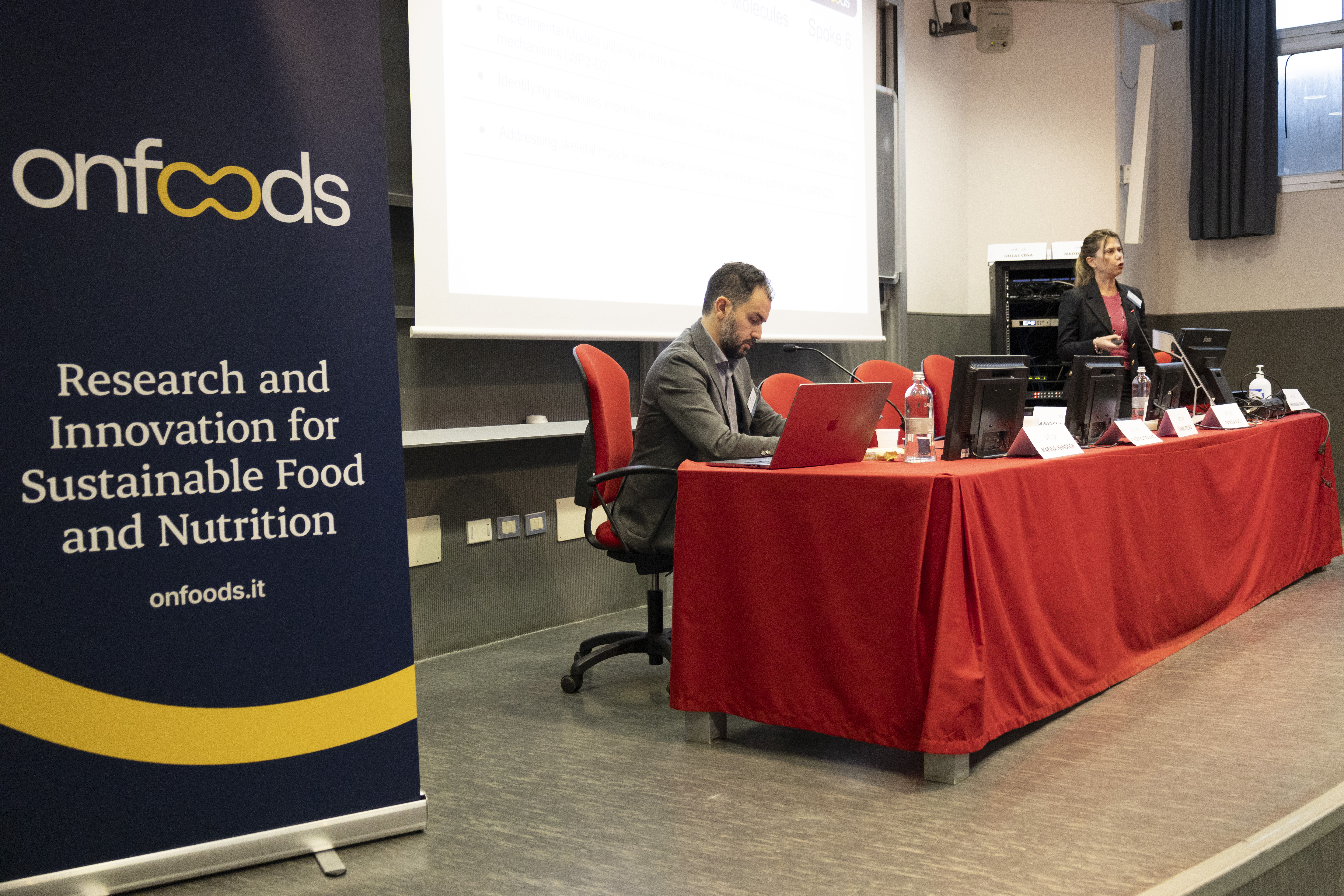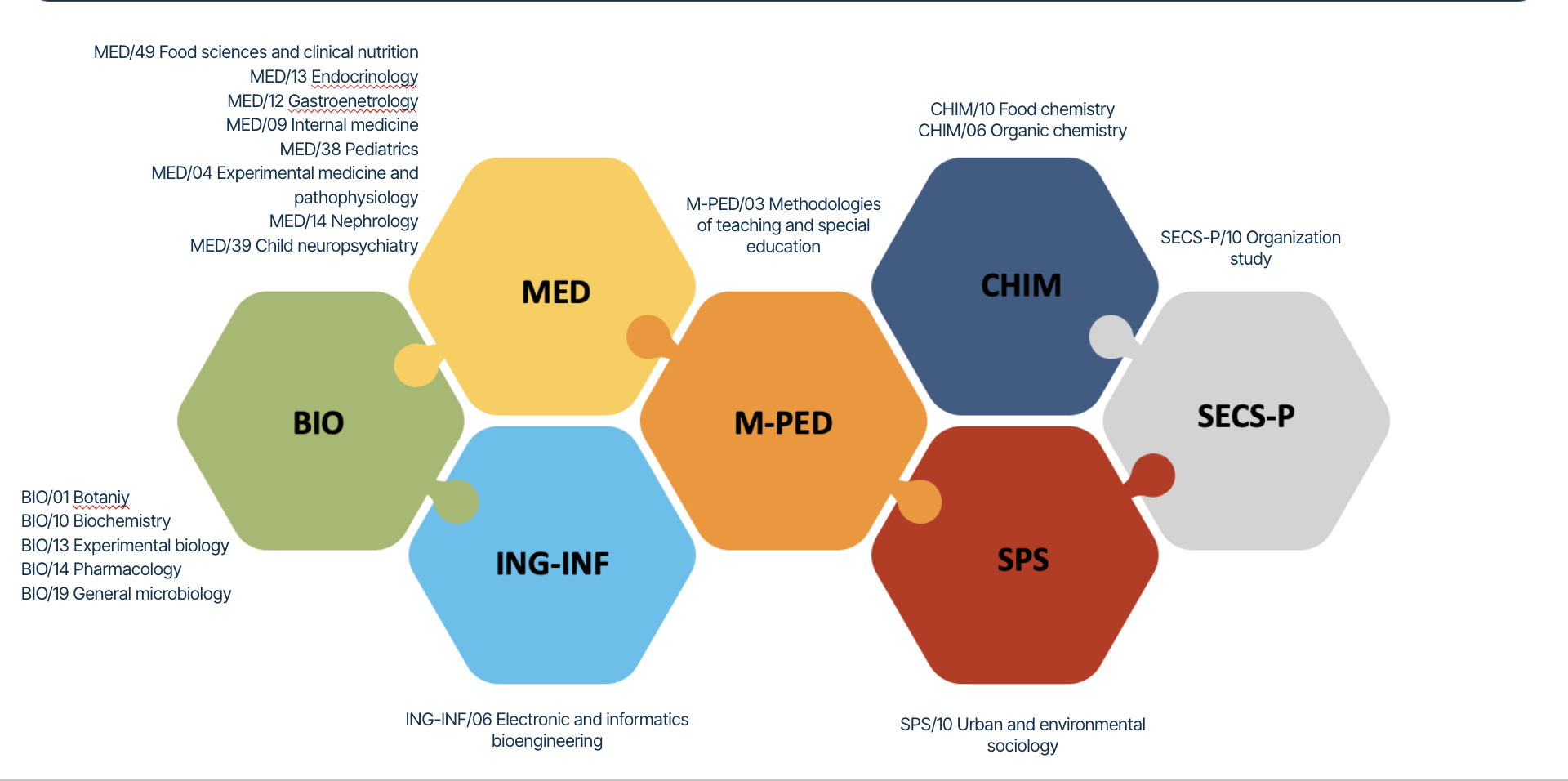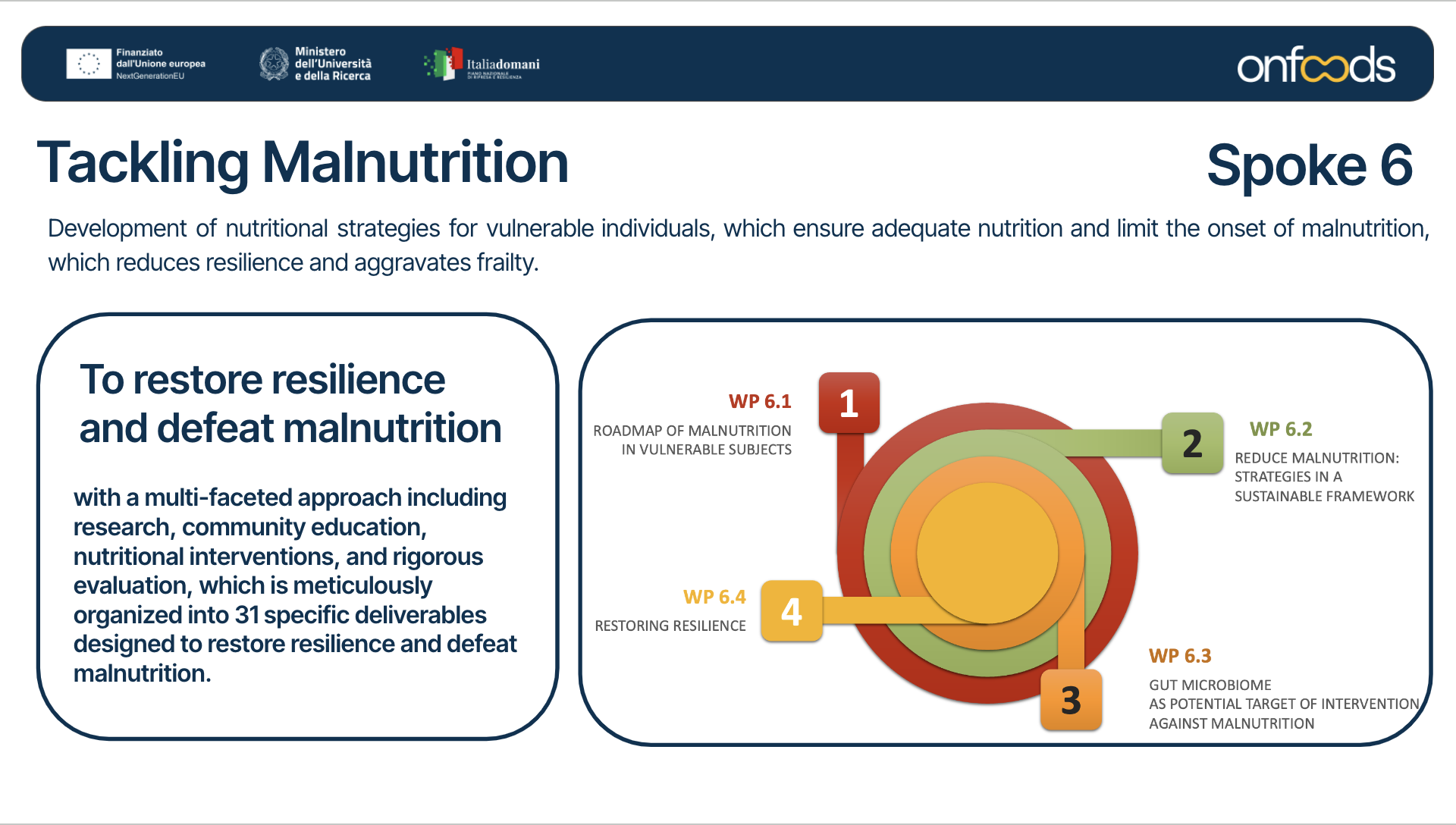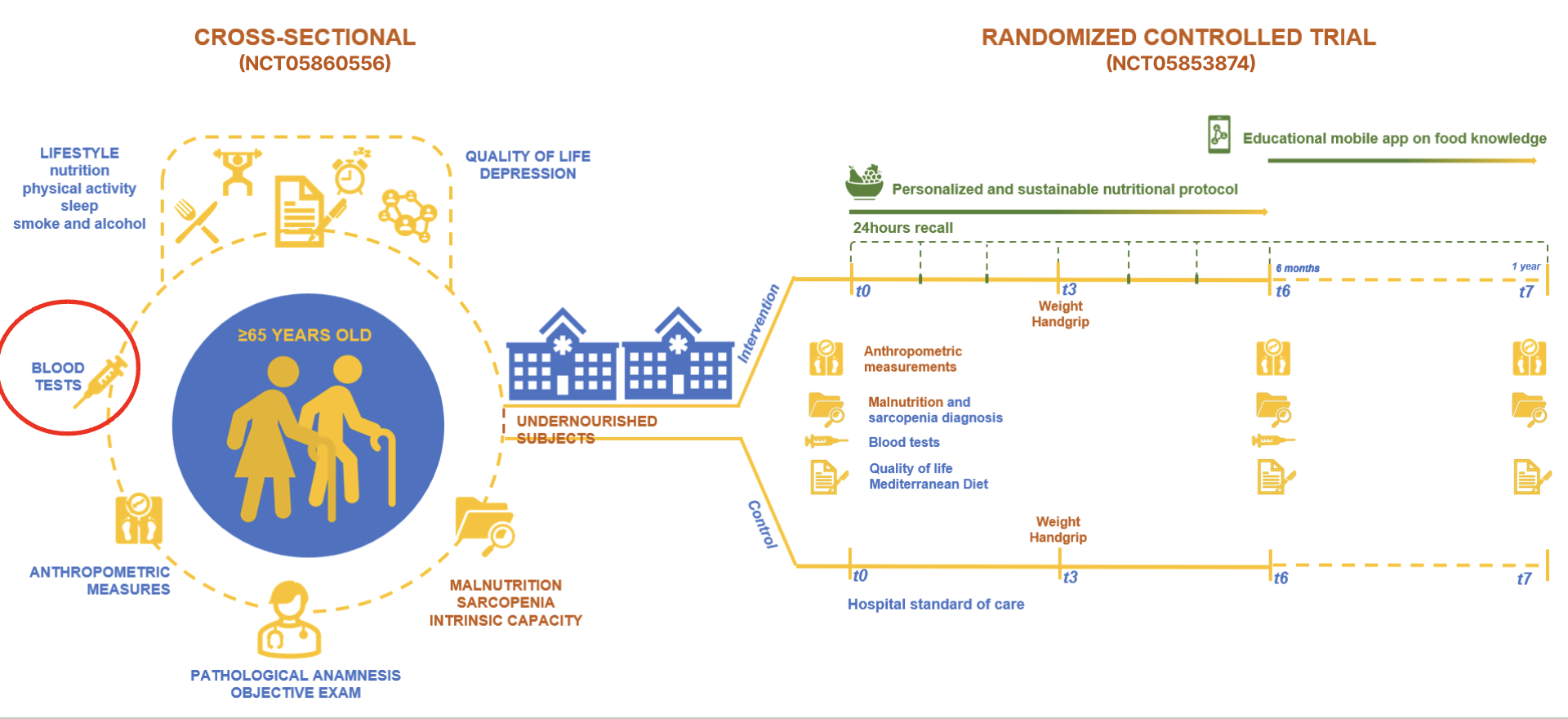Funded under the National Recovery and Resilience Plan (NRRP), Mission 4 Component 2 Investment 1.3, Theme 10.
Personalised Nutrition, Sustainable Dietary Practices, Shared Food Protocols: The Future of Malnutrition Research
An interview with Professor Hellas Cena, Vice-Rector for the Third Mission at the University of Pavia, who coordinates Spoke 6 'Tackling Malnutrition'.

Giulio Burroni
Communication manager
Malnutrition does not only affect those who lack sufficient food to eat, but also those who have too much food or who consume foods deficient in essential nutrients. Broadening the definition of malnutrition globally to include not only undernutrition but also overnutrition is crucial to addressing the complex challenges of food insecurity.
Therefore, malnutrition is a condition that requires integrated collaboration across disciplines and methods, and it cannot be addressed without proper information from the start. Urgent shared nutritional protocols are needed at all levels of healthcare governance.
We discuss this with Professor Hellas Cena, Vice-Rector for the Third Mission at the University of Pavia, who coordinates Spoke 6 "Tackling Malnutrition".

✅ Malnutrition is a complex phenomenon characterised by various factors, including a lack of access to sufficient and nutritious food. However, beyond obvious cases of malnutrition, there is a less evident epidemic, which develops in people who consume energy-rich but micronutrient-poor foods. Our approach to research, therefore, like many others in OnFoods, must take into account different disciplinary perspectives, considering the interconnections between health, food access, economics, and even policies. How do you manage this integrated multidisciplinary dialogue in Spoke 6?
Spoke 6 focuses on a more distinct clinical area compared to other OnFoods groups, targeting individuals who are at high risk of malnutrition or are already malnourished. Until now, the fight against malnutrition, despite recognising the problem, has been ineffective because there has never been a truly integrated approach. The issue is not just about working in a multidisciplinary manner but also being transversal, inclusive, and interconnected.
Malnutrition is a complex problem that must be addressed by creating a network of connections, starting with professionals with diverse expertise, such as doctors, nutritionists, dietitians, biologists, economists, and engineers among the researchers of Spoke 6. It is not enough to identify new biomarkers to prevent malnutrition; it is crucial to evaluate the impact of malnutrition on the healthcare system and understand how to improve it, reducing direct, indirect, and individual costs.

Clearly, the impact can be measured over the years, but we have already considered some indicators that will become more comprehensive as more competencies are integrated into the working group. The main challenge in Spoke 6 has been harmonising the language of the different professionals and proceeding with clear goals, focusing on the well-being of the individual.
"Until now, the fight against malnutrition, despite recognising the problem, has been ineffective because there has never been a truly integrated approach. The issue is not just about working in a multidisciplinary manner but also being transversal, inclusive, and interconnected."
✅ The Spoke 6’s first line of research begins with an observational study of the nutritional status and health conditions of the population at high risk of malnutrition. This involves creating a database that integrates biochemical, omics, nutritional, lifestyle, and dietary pattern data. Could you explain the importance of this preliminary phase and the current progress of the work?
In our observational study, we aim to understand the scope of the problem and its characteristics, starting with the definition of malnutrition. Malnutrition can be due to deficiency or excess; it can be visible, but it can also be invisible. One of the most common forms of malnutrition is the Micronutrient Deficiency, which is often difficult to diagnose. Inadequate consumption facilitates the development of this type of malnutrition, which over time significantly contributes to the development of chronic degenerative diseases, even during childhood.
These conditions, also known as non-communicable diseases (NCDs), are responsible for about 71% of global deaths, which equates to 41 million people every year. Among these, cardiovascular diseases are the leading cause, followed by cancer, respiratory diseases, and diabetes. NCDs are strongly influenced by modifiable factors related to lifestyle and the environment, such as our diet, physical activity, air quality, sleep quality, and stress levels. Estimates indicate that a significant portion of NCDs can be prevented by modifying behaviors and environmental conditions.
Malnutrition is a complex issue. Therefore, we believe that starting with a systematic review of literature and national and international data can significantly contribute to understanding its various facets and raising awareness among the population about the risks associated with inadequate diet.
Spoke 6 is addressing some of the most emerging issues related to malnutrition across different age groups and health conditions. Firstly, we have identified excess malnutrition among young children, as childhood obesity is a serious problem in Italy. Globally, we are among the countries with the highest rates of childhood obesity, a trend unfortunately on the rise. Concurrently, we are focusing on deficiency malnutrition in the aging population. Italy has one of the oldest populations in Europe and, compared to other countries, shows a significantly higher prevalence of malnutrition among the elderly: around 11% compared to 0.8% in Sweden, for example (Age and Ageing 2019; 48: 38-48. doi: 10.1093/ageing/afy144).
Finally, we are concentrating on a third emerging target, namely malnutrition in individuals with chronic inflammatory intestine diseases, that compromise nutritional status due to malabsorption.

✅ A specific area of research of Spoke 6 is focusing on the wellness of the intestine. If this organ becomes diseased, difficulties or issues in absorbing certain substances can arise even if taken correctly. How is your research advancing in this area?
Our intestine hosts a highly dynamic concentration of microbes that constitute a distinct organ known as the microbiota, formerly referred to as intestinal flora. The microbiota refers to the community of microbes residing in the intestine, involved in various physiological processes such as digestion, vitamin production, modulation of the immune system, and protection against pathogens. Moreover, they communicate with the brain through the intestine-brain axis, influencing our eating behavior and mood. Meanwhile, the microbiome describes the entire genetic makeup of this microbial population. Microbes in our body must be numerous and diverse to maintain a healthy balance, which is heavily influenced by our diet, physical activity, presence or absence of diseases, aging, and other lifestyle factors.
✅ Our research focuses on maintaining or improving the health of the intestine and microbiota. A healthy microbiota (eubiosis), characterized by a diverse array of microbes, is crucial for efficient nutrient absorption and utilisation. Reduced microbial diversity can compromise these processes, diminishing the effectiveness of nutrients in supporting our health.
Spoke 6 addresses these issues through in vitro and in vivo experiments, both cross-sectional and longitudinal, involving both children and adults. Specifically, the University of Naples carries out research on children, while the University of Pavia focuses on adults affected by chronic inflammatory intestine diseases. Additionally, in collaboration with CNR (National Research Council) and the University of Milano Bicocca, we are studying bioactive molecules and developing functional foods. This includes utilising microbes for specific fermentations to enhance the nutritional value of food products.
✅Thus, by shedding light on the functioning of an individual's intestinal microbiota, for instance, we can also work towards patterns of so-called personalised nutrition. This topic has become particularly trendy, emphasizing the need to distinguish between precision nutrition and personalised nutrition.
Nutrition is a branch of medicine, but it's important to clarify that precision nutrition is different from personalised nutrition. Precision nutrition aims to develop nutritional guidelines and recommendations based on the genetic and other omics characteristics of each individual, using sciences such as metagenomics, metabolomics, nutrigenomics, and nutrigenetics. This concept of "precision" is inspired by precision medicine, which focuses on developing treatments and drugs tailored to the individual characteristics of each patient with a specific condition, recognising "interindividual" differences.
A significant example of precision medicine is the development of mRNA-based vaccines, such as those created against COVID-19. These vaccines work by delivering genetic instructions to our body's cells to produce a specific protein. This protein then stimulates the immune system to recognise and attack the virus. In other words, the vaccine utilises a natural mechanism of our body, protein synthesis, to develop a targeted immune response.
Precision nutrition takes greatly into account interindividual differences, recognising that foods and their nutrients, as well as the absorption and secondary metabolites produced, can vary among individuals even with similar age and gender. These variations can contribute to the development of conditions, including malnutrition, with varying frequency.
However, it's important to acknowledge that we cannot adhere too rigidly to scientific data alone when determining dietary recommendations. Nutrition is much more complex and encompasses cultural, personal, ethical, religious, lifestyle, and environmental factors, as well as social aspects and many other variables that need to be contextualised and integrated with the significant insights provided by omics sciences. This is where personalised nutrition differs from precision nutrition: it takes into account the habits, choices, and preferences of individuals so that the diet is culturally and socially acceptable and therefore likely to be followed.
We cannot adhere too rigidly to scientific data alone when determining dietary recommendations. Nutrition is much more complex and encompasses cultural, personal, ethical, religious, lifestyle, and environmental factors, as well as social aspects and many other variables that need to be contextualised and integrated with the significant insights provided by omics sciences.
✅ The flagship projects SENIOR and BIOPROCOM of Spoke 6 address malnutrition in aging and chronic diseases through the use of sustainable dietary models and the development of new functional foods. Adopting sustainable dietary models and conceiving new functional foods can play a crucial role in reducing the prevalence of malnutrition in these populations?
SENIOR is a two-phase study: an initial cross-sectional phase and a subsequent nutritional intervention phase (RCT). In the cross-sectional phase, we measure various sociodemographic and anthropometric variables such as lifestyle, wellness, diet, and blood tests including biomarkers like chemokines/cytokines. The aim is to identify how many aged individuals are malnourished, both among those managed in outpatient clinics for various conditions and those hospitalised. Early identification of malnourished or at-risk subjects allows for better outcomes in terms of effectiveness of pharmacological and surgical therapies and reduces mortality.
The subsequent phase involves a randomised clinical trial aimed at evaluating the effects of a personalised sustainable nutritional protocol on the nutritional status of malnourished elderly individuals after six months of intervention, comparing it with standard hospital care.

In Italy, specific nutritional guidelines exist for various conditions, including malnutrition, provided by ESPEN and other organisations. However, unlike diseases such as cardiovascular or oncological conditions, managing malnutrition requires a more personalised approach due to its complexity. Despite the existence of guidelines, protocols for malnutrition lack national uniformity. Notably, nutritional assessment is not routinely conducted on all patients upon admission to hospital facilities, whether for hospitalisation or outpatient visits. This gap often results in nutritional intervention occurring only when the patient is already in an advanced state of malnutrition, necessitating artificial nutrition. Implementing dietary models to proactively deal with malnutrition could significantly reduce healthcare costs and improve treatment outcomes and patient quality of life.
BIOPROCOM, on the other hand, is a project primarily conducted by CNR; its aim is the identification of bioactive molecules extracted primarily from plant-based products, which can serve as ingredients in functional foods rather than nutraceuticals. Due to its rich biodiversity, Italy has enormous potential to extract bioactive molecules not only from plants but also from by-products, using innovative technologies. This enhances economic and environmental sustainability while strengthening the local economy, creating new businesses, and valorising the territory. This integrated approach supports sustainable economic growth and contributes to conserving natural resources for future generations.
Despite the existence of guidelines, protocols for malnutrition lack national uniformity. Notably, nutritional assessment is not routinely conducted on all patients upon admission to hospital facilities, whether for hospitalisation or outpatient visits. (...) Implementing dietary models to proactively deal with malnutrition could significantly reduce healthcare costs and improve treatment outcomes and patient quality of life.
✅ OnFoods promotes a cascade funding scheme to support research projects initiated by external companies and public/private research entities outside the partnership but interested in the topics addressed by the Spokes. The University of Pavia, as the lead of Spoke 6, launched a cascade funding call for fundamental research activities, industrial initiatives, and experimental development projects. The call, targeting businesses, universities, and research centers, closed in early February 2024. What feedback have you received?
The University of Pavia, leading Spoke 6, recently closed a cascade funding call and received numerous applications. An evaluation and a technical-scientific committee selected projects, allocating a total funding of 1.550.000€. The University of Pavia's website has just published the approval of the evaluation outcomes. We launched the call on two main research lines: one focused on intestine health and specifically on the microbiota, and the other on alternative protein sources, particularly those from legumes. Italy, once a leader in the production and consumption of legumes, staples of the Mediterranean diet, now paradoxically ranks highly in their importation. Legumes, used in a balanced manner, can be valuable substitutes for nutrients of animal origin, the production of which cannot be further increased due to environmental impact.
✅ Lastly, Spoke 6 aims to restore resilience in individuals suffering from malnutrition. How do you interpret the multifaceted concept of resilience in your work? In the future, it will be increasingly crucial to ensure public health by providing everyone with information on sustainable eating habits. Therefore, as Vice-rector for the Third Mission, how do you plan to manage the dissemination of sustainable dietary practices?
Resilience is a widely discussed concept. It became popular because of the Sars-Cov2 pandemic and highlighted the vulnerability of individuals with limited residual functional capacity, often elderly and malnourished. The aged population, already affected by malnutrition issues, demonstrated greater difficulty in recovery compared to other demographic groups. Individuals with obesity and/or nutritional deficiencies also struggled to respond to the illness.
The resilience model can easily be applied to other diseases: an individual with inadequate nutrition will struggle to overcome any illness, including oncological conditions. In the UK, they are introducing mandatory prehabilitation protocols for oncology patients, which include nutritional, psychological, and physical rehabilitation before pharmacological and surgical treatments. Resilience is built through proper diet to swiftly maintain or restore adequate nutrition, especially in the presence of a disease. In Italy, many oncology pathways have achieved a good level of interdisciplinarity, but there is often a lack of proper and timely assessment of nutritional status of the patients, as well as the activation of shared protocols from the early stages of diagnosis.
✅ If we talk about prevention, we cannot ignore communication practices and therefore the dialogue between research, the innovation world, and society...
Accurate information on nutrition must begin upstream in the care process, but often lends itself to scientifically incorrect or superficial communication practices. My experience as Vice-rector for Third Mission at the University of Pavia leads me to believe that scientific outreach should perhaps become one of the main missions of universities. Researchers' work should be discussed with those involved in dissemination and communication so that society is always informed and engaged in the processes.
"My experience as Vice-rector for Third Mission at the University of Pavia leads me to believe that scientific outreach should perhaps become one of the main missions of universities"
✅ Can you anticipate what the next steps will be in the research activities of Spoke 6, from now until the end of the project?
The next step is to complete ongoing clinical studies, both observational and intervention-based, and provide applicable research outcomes. Additionally, we aim to contribute to advancing knowledge and understanding in this field. We also intend to identify prototypes that can interface with other Spokes, such as those developing functional foods (Spoke 3), assessing quality (Spoke 5), or focusing on food policies and education (Spoke 7).
Our next objectives include finalising all initiated research projects, compiling and disseminating their results.
We are also engaged in cross-disciplinary training activities for all young researchers recruited through the OnFoods funding. It's crucial for each individual to specialise deeply in their field, but it is also necessary to broaden their perspective.
Additionally, we are committed to providing training for young researchers funded by OnFoods, aiming for them to specialise in their disciplines while gaining a broader, cross-disciplinary perspective.
Finally, our aim is to measure the impact of our research on society, with the goal of fostering meaningful dialogue among research, society, and the job market, promoting a small cultural revolution in Italy.

Giulio Burroni
Communication manager
Specialist in Communication and Project Management with over 8 years of experience in agency work. Currently involved in communication, branding, and design projects within the public administration, research institutions, and university sectors


